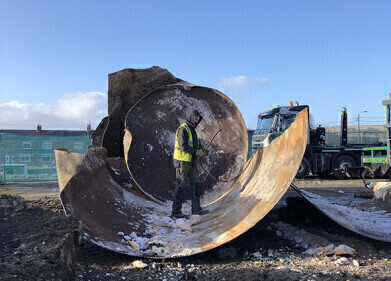Soil remediation
What is the Future of Soil Treatment?
Aug 01 2015
The importance of the earth upon which we stand shouldn’t be underestimated. It fosters the fruits, vegetables and grains during their growth which we ultimately eat to sustain ourselves. Clearly, ensuring this soil is free from contamination is of paramount concern.
With this in mind, a growing emphasis has been placed on soil remediation and treatment over the last decade or so. Whereas traditionally soil has been largely free of pollutants, the dramatic upsurge of industrialisation across the globe has led to greater contamination through the sewage, waste products and other unwanted side-effects of factories, businesses and homeowners. Meanwhile, agriculture has led to the widespread use of pesticides and fertilisers, which are often harmful for the health of the soil.
Bioremediation
An increasingly popular method of tackling contaminated soil is not through the use of chemicals or other artificial cleansers – which run the risk of simply polluting the earth further – but through organic means. Composting and animal manure can be used to treat some types of soils, but there are certain sophisticated compounds which can’t be broken down in this method. For example, polyaromatic hydrocarbons (PAHs) polychlorinated dibenzo-p-dioxins and dibenzofurans (PCDD/Fs), tributyltin (TBT), polychlorinated biphenyls (PCBs) and trinitrotoluene (TNT) are all persistent organic pollutants which can’t be purged using traditional methods.
Luckily, scientists have developed an innovative new way of tackling these difficult compounds using fungi. Though fungal treatment is still at the test stage and has only been trialled in the lab, the initial results were promising and our mycological friends could offer the key to the future of soil treatment.
Alternative Fertilisers
Late last year, a four-year scientific analysis concluded that systemic pesticides pose a global threat to biodiversity and ecosystems, with particular relation to bees and similar invertebrate species. Neonicotinoids and fipronil in particular were found to be very damaging to the soil upon which they were sprayed, contaminating the flowers and plants which grow in it and thus poisoning the bees which feast upon them.
Again, scientists have sought to redress the balance by campaigning for an outright ban on these pesticides whilst simultaneously looking for an organic alternative. Though the battle to outlaw these contaminants is still ongoing, some breakthroughs have been made in the world of organic fertilisers.
Anaerobic digestion (AD) has been touted as an environmentally-friendly method of producing biogas – but it also has an unexplored secondary function. During the process, digestate is produced which can be used as an excellent organic fertiliser due to its high nutrient content and fully-fermented state. As such, it could be the perfect alternative to traditional fertilisation methods. For more information on the subject, check out the article The Use of Digestate as an Organic Fertiliser.
Growing Awareness the World Over
Such is the growing awareness of the importance of clean soil that even China, traditionally one of the most polluted countries in the world, has begun to clear up its act. During the 90s, China had an incredible 83% of its soil in a contaminated state. Last year, the government pledged to spend $350 billion in tackling soil remediation – 3% of the total revenue of Shanghai.
If the Chinese are serious about cleaning up its earth, the future of soil treatment is looking positive.
Events
Mar 18 2025 Expo Santa Fe, Mexico
Mar 18 2025 Moscow, Russia
Mar 19 2025 Manila, Philippines
Mar 20 2025 Guangzhou, China
Mar 24 2025 National Harbour, MD, USA














